Easy read and plain English newsletters
Our newsletters tell you about what we are doing to make the NHS better for people with a learning disability and autistic people.
If you want us to post you a paper copy just let us know on engage@nhs.net
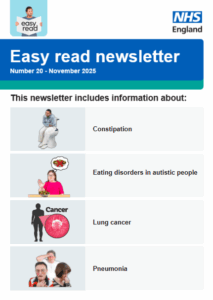 Easy read and plain English newsletter: number 20
Easy read and plain English newsletter: number 20
This issue includes information about:
- constipation
- eating disorders in autistic people
- lung cancer
- pneumonia
Please click on this feedback form to give us your views.
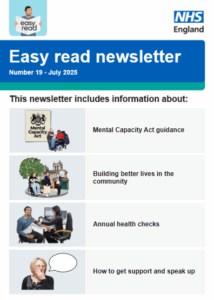 Easy read and plain English newsletter: number 19
Easy read and plain English newsletter: number 19
This issue includes information about:
- Mental Capacity Act guidance
- building better lives in the community
- annual health checks
- how to get support and speak up
Please click on this feedback form to give us your views.
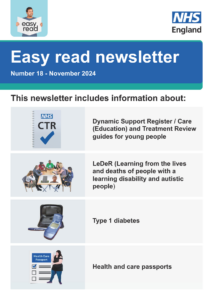 Easy read and plain English newsletter: number 18
Easy read and plain English newsletter: number 18
This issue includes information about:
- The Dynamic Support Register (DSR) and Care (Education) and Treatment Review (CETR) guides for young people
- what is LeDeR and why is it important?
- understanding diabetes
- the importance of health and care passports
- how to get support and speak up
- give feedback on our newsletter
Please click on this feedback form to give us your views.
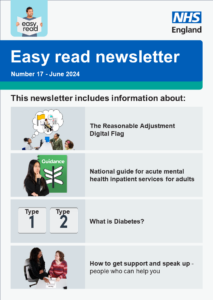 Easy read and plain English newsletter: number 17
Easy read and plain English newsletter: number 17
This issue includes information about:
- the reasonable adjustment digital flag
- national guide for acute mental health inpatient services for adults
- what is diabetes?
- how to get support and speak up – people who can help you
- keep updated
We would like to know what you think! You can give us feedback on the newsletter at engage@nhs.net
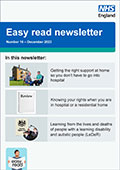 Easy read and plain English newsletter: Issue 16
Easy read and plain English newsletter: Issue 16
This issue includes things around your rights when in, or going into, a mental health setting:
- getting the right support at home so you don’t have to go into hospital
- knowing your rights when you are in hospital or a residential home
- getting the right medication
- learning from the lives and deaths of people with a learning disability and autistic people (LeDeR)
We would like to know what you think! You can give us feedback on the newsletter at engage@nhs.net
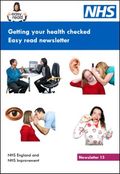 Easy read newsletter: Issue 15
Easy read newsletter: Issue 15
This issue is about encouraging you to use primary care services and not being scared because of coronavirus. It’s a reminder to:
- get your health checked out
- is it time to go to the dentist?
- get your eyes and ears checked out
- go to your screening appointment
- what to do if you have problems with your local health service
You can also read about how to get help with your thoughts and feelings, help with your appointments and what to do if you think you have a problem that needs to be checked.
We would like to know what you think! You can give us feedback on the newsletter at engage@nhs.net
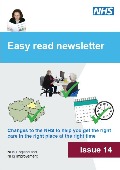 Easy read newsletter: Issue 14
Easy read newsletter: Issue 14
This issue is mostly looking at changes that are happening in the NHS which includes:
- services working together – integrated care systems (ICSs)
- NHS led provider collaboratives – plans for mental health, learning disability and autism services
- primary care networks – how local services are working together to give you the best care
You can also read about getting vaccines for a healthy winter.
We would like to know what you think! You can give us feedback on the newsletter at engage@nhs.net
Easy read newsletter: Issue 13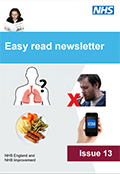
In this issue you can find out about:
- lung cancer – signs of lung cancer and what to do
- smoking and e-cigarettes (vaping) – tips to help you or your friends or family stop smoking
- healthy eating – what healthy eating is, and why it is important to eat well
- NHS App – what the NHS App is and how you get it
We would like to know what you think! You can give us feedback on the newsletter at engage@nhs.net
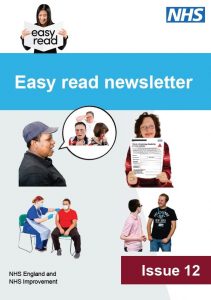 Easy read newsletter: Issue 12
Easy read newsletter: Issue 12
In this issue you can find out about:
- coronavirus including information about the coronavirus vaccine
- coronavirus grab and go guide
- having a key worker
We would like to know what you think! You can give us feedback on the newsletter at engage@nhs.net
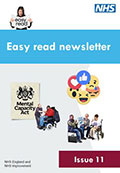 Easy read newsletter: Issue 11
Easy read newsletter: Issue 11
In this issue you can find out about:
- getting help with difficult feelings – help when you’re feeling sad, angry, worried or confused
- support for children and young people in crisis – spotting signs you’re in crisis and how to get help
- The Mental Capacity Act – getting the right support to make decisions
We would like to know what you think! You can give us feedback on the newsletter at engage@nhs.net
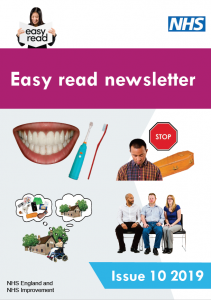 Easy read newsletter: Issue 10
Easy read newsletter: Issue 10
In this issue you can find out about:
- looking after your teeth
- mindfulness – learning to settle your mind and relax
- reducing restrictive practices
- stopping people dying too soon
- social prescribing – getting help through other things rather than medicines and treatment
We would like to know what you think! You can give us feedback on the newsletter at engage@nhs.net
Easy read newsletter: Issue 9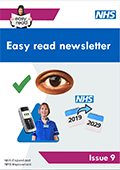
In this issue you can find out about:
- The NHS Long Term Plan
- looking after your eyes
- summary care records
- learning from people’s deaths
- getting medication right for children and young people
- personalised care
- getting support in the criminal justice system
- NHS 11 helpline
We would like to know what you think! You can give us feedback on the newsletter at engage@nhs.net
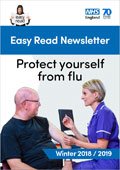 Easy read newsletter: Winter 2018-19
Easy read newsletter: Winter 2018-19
In this edition you can find out about:
- sepsis – when your body react badly to infection
- Care and Treatment Reviews and getting ready to leave secure hospitals
- Ask Listen Do, helping services to be better at listening to people
- protecting yourself from flu
- learning from deaths of people with a learning disability
We would welcome feedback on the newsletter at engage@nhs.net
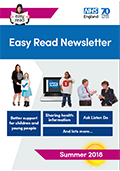 Easy read newsletter: Summer 2018
Easy read newsletter: Summer 2018
In this edition you can find out about:
- supporting young people who have problems with mental health or behaviour that challenges
- stopping over medication of people with a learning disability autism or both
- Ask Listen Do, helping services to be better at listening to people
- sharing your information so that different parts of the NHS know how you like to be treated
- a thank you from Ray James, the Director of Learning Disabilities at NHS England
We would welcome feedback on the newsletter at engage@nhs.net
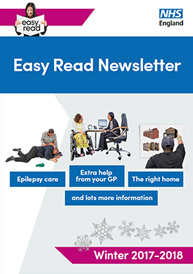 Easy read newsletter: Winter 2017
Easy read newsletter: Winter 2017
In this edition you can find out about:
- epilepsy care
- the right home can help
- extra help from your doctor, like annual health checks
- transforming care partnerships – checking how they are doing
- meet the NHS England family carer advisors
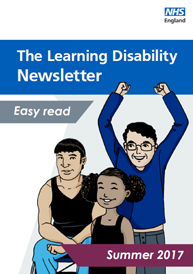 Easy read newsletter: Summer 2017
Easy read newsletter: Summer 2017
In this edition you can find out about:
- Jean O’Hara who is our new national clinical director for learning disability
- Care, Education and Treatment Reviews for children and young people
- how we are helping people who find it hard to swallow (sometimes called dysphagia)
- what happened at our complaints, comments and feedback event
- how we are helping organisations who plan services for people with a learning disability, autism or both
- our work to make sure we are learning from the deaths of people with a learning disability
Easy read newsletter: Spring 2017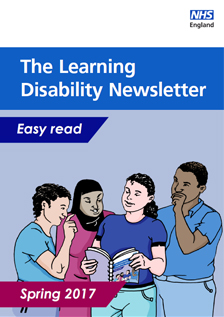
In this edition you can find out about:
- our new NHS England learning disability and autism advisory group
- how we are making it easier to complain about NHS services
- the updated care and treatment review policy
- how we are helping people get the right care when they have diabetes
- 0ur new quality checking tools
- two new videos about NHS 111 and how you can get involved in our work
Easy read newsletter: Autumn 2016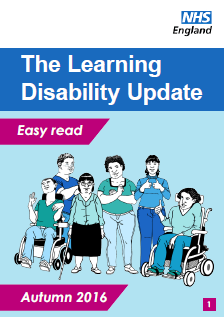
In this edition you can find out about
- what Simon Stevens, Chief Executive of NHS England thinks about our Learning Disability Programme
- our cancer and breast screening programmes
- how a personal health budget can help you
- transforming care partnerships
Easy read newsletter: Summer 2016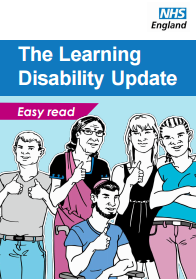
In this edition you can find out about:
- medicines for people with a learning disability, autism or both
- how annual health checks
- our NHS England Learning Disability and Autism Advisory Group
- Our Transforming Care Programme
